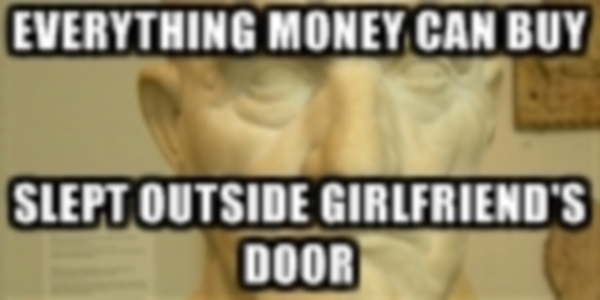
March 17, 2014, by Helen Lovatt
Martial and first world problems
The first world problem meme might seem a relatively recent invention but the late first-century AD poet Martial was already playing with the idea. Some examples of #firstworldproblems: ‘Just got a splinter in my finger from an avocado stone. Guacamole injury.’ ‘No shiraz so had to use merlot in the beef bourguinon.’ featured here. More here.
In my first year Introduction to Literature lectures we have been looking at Martial on gender and sexuality, and exploring the ways that the late-first-century satirical epigrammatist evokes and parodies the discourse of Roman love poetry. In epigram 10.14 (trans. Kline) he mocks a rich lover:
Though a fitted carriage bears your painted servants,
though a Libyan horseman sweats in a trail of dust,
and purple draperies dye your Baian villas
and Thetis’ waters yellow with your creams,
though draughts of Setine brim your lucent crystal,
and Venus sleeps beneath no softer down,
still at night you lie at a proud girl’s threshold
drenching, alas, her mute door with your tears,
while ceaseless sighs burn through your wretched breast.
Want to know your curse, Cotta? You’re too well off.
The first six lines build up the luxury of Cotta’s life: a luxury carriage, even his servants are well-dressed, the exotic proper names convey imperial power over far countries (the Libyan horseman) and the elements (the sea, personified as Thetis, is just a medium for bathing). Baiae is a notoriously luxurious holiday spot (the Maldives?), and his beautiful crystal ware holds very expensive wine. Even his bed clothes are the height of luxury, and appropriate for the goddess Venus herself. But the pay-off turns all this luxury upside down: rather than sleeping under his duck-feather duvet, Cotta spends the night on the hard ground playing the locked-out lover, trying unsuccessfully to persuade his mistress to let him in. The door drenched by tears and the burning sighs of love all evoke poets such as Propertius from earlier in the first century.
Is Martial straightforwardly parodying love elegy? The epigrams often have a structure of build-up and pay-off, as here. Martial’s pay-off can work in more than one way, though. Reading it as a ‘first-world problem’, Cotta is so well-off that he has to find something to agonise about. This suggests a keen sense of the artificiality of love elegy: complaints concocted by those with nothing else to worry about.
However, the discourse of luxury is also a key element of love elegy: the elegist is poor and cannot provide the expensive gifts his mistress desires. He can only compete by making her immortal through his poetry. This poem, could, therefore, work in harmony with love elegy: Cotta is just too rich to play the elegist. Why lie outside her door, when he could just give her an expensive gift and get in?
No comments yet, fill out a comment to be the first

Leave a Reply